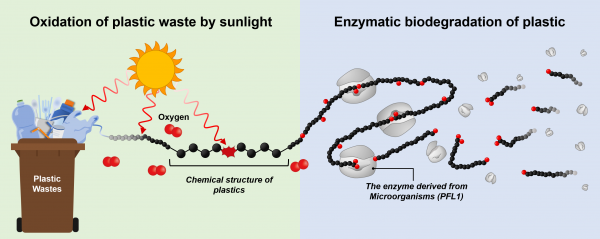Newswise — Every year, 400 million tons of plastic products are produced around the world, half of which are single-use items that are thrown away within a year. In particular, most non-biodegradable plastic waste, which takes over 500 years to decompose naturally, is disposed of in landfills. During this process, microplastics are formed that can disrupt ecosystems or accumulate in living organisms, increasing their harmful effects. Landfills around the world are reaching capacity, making it increasingly urgent to address this problem.
A research team led by Dr. Ahn Jeong-ho of the Clean Energy Research Center of the Korea Institute of Science and Technology (KIST, President Oh Sang-rok) has developed a technology to biodegrade polyethylene using enzymes derived from microorganisms.
Polyethylene accounts for 35% of the plastic produced annually and is widely used for a variety of purposes, including packaging materials and plastic bags. Like other non-biodegradable plastics, polyethylene is often disposed of in oceans or soil, where it is continually oxidized by air and sunlight. The research team was the first to successfully identify an enzyme that can break down this oxidized polyethylene.
The research team focused on lipase, an enzyme that breaks down natural polymeric lipids that have a chemically similar structure to polyethylene. They then developed a lipase purification and production process based on synthetic biology and successfully discovered Pelosinus fermentans lipase 1 (PFL1). When this lipase from the anaerobic bacterium Pelocinus fermentans was applied to polyethylene, the weight average molecular weight decreased by 44.6% and the number average molecular weight decreased by 11.3%, indicating the degree of biodegradation. Furthermore, they observed cracks and tears on the surface of the decomposed polyethylene using electron microscopy, confirming the biodegradation process caused by enzymes.
The research team also used computer simulations to analyze the interaction between PFL1 and polyethylene, elucidating for the first time the mechanism of biodegradation. They observed that the PFL1 enzyme strongly binds to the polyethylene surface and breaks it down into small segments. These findings are expected to be useful in enhancing the properties of the PFL1 enzyme and in the search for new plastic biodegradation enzymes.
Current methods of disposing of plastic waste, such as incineration and chemical decomposition, produce toxic substances during decomposition and require expensive catalysts. However, the PFL1 enzyme can be mass-produced using renewable resources, and the process does not generate any harmful substances, making it an environmentally friendly technology. Additionally, the alcohols and carboxylic acids produced during the biodegradation process can be used to resynthesize plastics and produce chemical materials.
Dr. Ang said: “Newly discovered enzymes have shown the potential to biodegrade non-degradable plastic waste, which has been difficult to treat so far. We hope to commercialize this technology and reduce the saturation of landfills. We aim to solve the problem and create a sustainable circular economy for plastics.”
###
KIST was established in 1966 as Korea’s first government-funded research institution. KIST currently strives to solve national and societal challenges and secure growth engines through advanced and innovative research. For more information, please visit the KIST website https://eng.kist.re.kr/.
This research was supported by the Ministry of Science, Technology, Information and Communications (Minister Sang Im Yu) under KIST’s Major Projects, Creative Interdisciplinary Research Program (CAP20024-300), and Nuclear Research and Development Program (RS-2022-00156234). received support. The results were published in the latest issue of the international journal Bioresource Technology (IF 11.1, JCR 2.5%).

